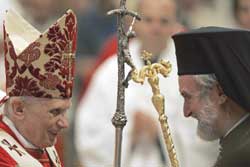[I have shortened Alan Brownâ??s response to Vincent Rossi. You can see Alanâ??s whole reply in the comments to Vincent Rossiâ??s piece â??Participationâ??]
â??For Maximus, communion means precisely mystagogy, and mystagogy means initiation into and participation in the Great Mystery, and the Great Mystery is the Incarnation of the Logos, One of the Holy Trinity, through which, by perchoresis or reciprocal indwelling, human beings may be deified and all nature transfigured.â??
It is nice that Mr Rossi knows the meaning of Ï?εÏ?ιÏ?Ï?Ï?ηÏ?ιÏ?. However, he does not seem to be aware of the difference between μÏ?Ï?Ï?αγÏ?γία, which means the leading-into the mystery that is communion, and communion itself. (This is evident from the two occurrences of the term μÏ?Ï?Ï?αγÏ?γία in the Mystagogy, both of which occur in ch. 2 of the text.)
Mr Rossi continues: â??We have heard a lot about â??relational ontologyâ?? over the past decade or so. St. Maximosâ?? ontology is the authentic relational ontology of patristic Orthodoxyâ??.
Such talk of â??relational ontologyâ??, however, is likewise vacuous (as is of course the meaningless term â??authenticâ??). Certainly for Maximus, neither communion nor participation (which are not simply synonymous) fall within the category of relation. For participation in the Logos is constitutive of the being of things, whilst communion actualises the identity (Ï?αÏ?Ï?Ï?Ï?ηÏ?) of all things – something not true of relation. Possibly, Mr Rossi means to say this by the language of relation. However, his language â?¦ seems to betray aâ?¦ commitment to a univocal ontology of the entity, according to which different entities can only have ontological connection through the category of relation. Such is typical of Roman Catholic scholastic interpretation of St Maximus.
After this, Mr Rossi commits himself (and Maximus) to belief in â??the timeless essence of beingsâ??. Again, this is â?¦ betrays a foreign ontology to that of St Maximus. For, according to our Holy Father in God, all being apart from God is temporal, so that the essence of any created being is the essence of a temporal being. As such, temporality is intrinsic to the essence of any such being – for the essence has real existence only in a temporal being. Here it seems to me that Mr Rossi betrays unthinking commitment to a modernist Neoscholastic understanding of essence.
Moreover, his equation of â??substance-languageâ?? with â??hellenismâ?? is disingenuous. Maximus has no doctrine of â??substanceâ?? at all. Î?Ï?Ï?ία means â??beingâ?? (participle) and does not possess the same meaning as â??substanceâ?? at any stage in the history of that term, from Cicero onwards. Again, it is unhelpful to assimilate Maximusâ?? thought to the conceptual structures of scholasticism. And there is nothing hellenic about the notion of being.
After this, we read Mr Rossi speaking of â??an ontology that grounds the unity, union and communion of the Uncreated and the created in the everpresent hypostatic reality of Christâ??s Godmanhood and the everpresent energetic grace of the Life-giving Holy Spirit.â??
Here we note with unease the use of Solovievâ??s term â??Godmanhoodâ??. Perhaps Mr Rossi could explain why he thinks it appropriate to correlate conceptually Maximusâ?? thought with that of nineteenth-century Russian religious philosophy? He critiques Zizioulasâ?? interpretation of Maximus by assimilating Maximusâ?? thought to that of Soloviev.



